| |
"Are you willing to undertake a dangerous mission for the United States knowing in advance you may never return alive?" |
| |
The opening line of every episode of the Cloak and Dagger radio series |
America's Central Intelligence Agency has an unsavoury history. Its role in helping to destabilise governments in order to install leaders that are USA-friendly has cost countless lives and is an affront to democracy. Yet just recently its work in confirming Russian interference in American elections – which itself is an affront to democracy – has strangely angered the leader of the very country it was set up to serve. To save some review space, I'll avoid getting deeper into the politics of the Agency's more nefarious activities for now. Another time, maybe. Did I just hear a huge sigh of relief from the gallery? Anyway, the CIA was officially formed under its current name in 1947, but during World War II existed under a different guise as the Office of Strategic Services, or OSS. As with the CIA, its activities tended to be largely (and unsurprisingly) secretive, but in its final days there was an unexpected PR push to highlight its work and give it a positive public spin. Suddenly, after saying nothing about the OSS during the war itself, a flurry of films appeared showcasing its work and its personnel. One of the first was Fritz Lang's Cloak and Dagger, the title being a reference to the agency's self-acknowledged undercover modus operandi.
The opening scene says a lot with only minimal dialogue. In the dark of night, a Nazi soldier keeps guard on a bridge as a goods train passes below. A man hides in the shadows and takes notes, then heads to a tavern, where he passes a secret signal to the barman, who subtly directs him upstairs. Two shifty-looking men who are drinking at a nearby table finish up and quietly follow him. The man is met in an upstairs room by a comrade, who retrieves a hidden transmitter from behind a pile of logs and starts sending a signal while the visitor gets to work encoding the information he has gathered. The coded part of transmission begins, but is interrupted midway when the two men from downstairs burst in and shoot the two partisans dead. Back in Washington, two marker pins are removed from a giant map of Europe. Good, solid cinematic storytelling.
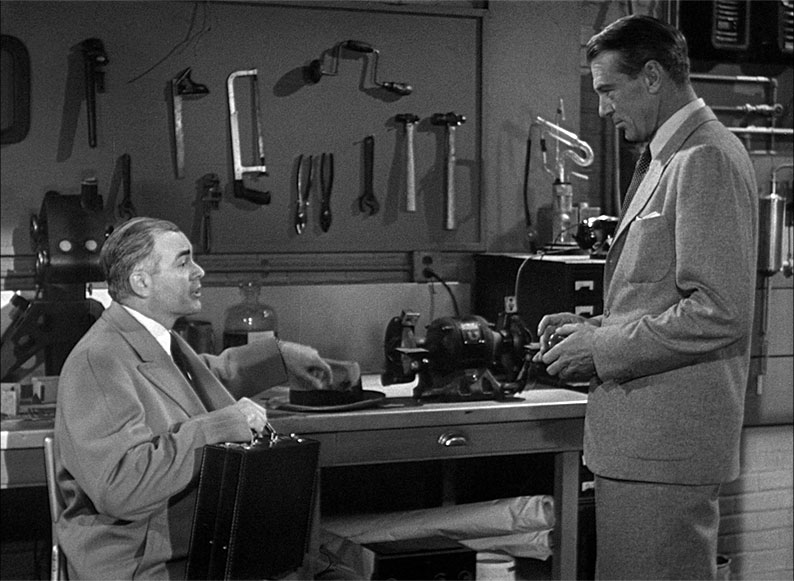
What the American military bigwigs do know is that the Nazis are transporting whole trainloads of pitchblende, an ore-mineral from which uranium is sourced, as well as all of Norway's monazite, a key source of radioactive thorium. Any guesses what they're planning to do with this? We, of course, have decades of hindsight on our side, but Cloak and Dagger is set during World War II, at the very dawn of the atomic age, and the officer in charge, one Colonel Clem Walsh (James Flavin), is sorely in need some expert advice and assistance. Enter his old fraternity brother, Alvah Jesper (Gary Cooper), a university professor who just happens to also be working on the Manhattan Project (look it up if that somehow means nothing to you). Alvah quickly surmises that the mining and transportation of these materials in such quantity can only mean one thing, that the Nazis are trying to build an atom bomb. It turns out that Walsh is already convinced of this fact and what he really needs is for Alvah, who conveniently is able to speak a little German, to join his team. Given the stakes, he doesn't take much persuading.
What follows does and doesn't play to expectations or convention. When Alvah is told that his first job will be to meet with respected German scientist Katerin Lodor (Helen Thimig), who has been forced to work for the Germans but escaped to Switzerland, my heart sank just a tad. Alvah is the male lead, Katerin is female and in Hollywood films of the period (and too often since) this means they will fall for each other, usually in an unfeasibly short space of time. The star-struck Alvah's claim that Katerin used to be his scientific pin-up girl would seem to seal the deal, but her newspaper picture tells a different story. She's middle-aged and unglamorous, and if Gary Cooper is going to have a romance in a 40s Hollywood film, it's going to be with someone younger and classically prettier than Katerin, or indeed him. Thus when he and Katerin meet their relationship is based solely on mutual respect and the importance of the information Katerin has in her smarter-than-Alvah head. But she's still in hospital and weak from her arduous journey across the Alps and strained by the threats being made by the Nazis to execute ten Hungarians for every day that she refuses to return. Alvah has a plan (one that I can't believe wouldn't have occurred to someone as smart as Katerin), and spurred on by his support Katerin assures him they'll have a long chat tomorrow after she's rested. Uh-oh. In movies, when someone doesn't tell you what you want to know and instead assures you that they'll reveal everything when you come back tomorrow or when they meet you in secret later that evening by the old boathouse, then you can bet your bottom dollar that something is going to stop that meeting from taking place. Usually the interested party arrives at the meeting place to find their contact has kept the appointment but is mysteriously dead. Here the news arrives the next morning that Katerin has been kidnapped, and we don't have to be told to realise by whom.
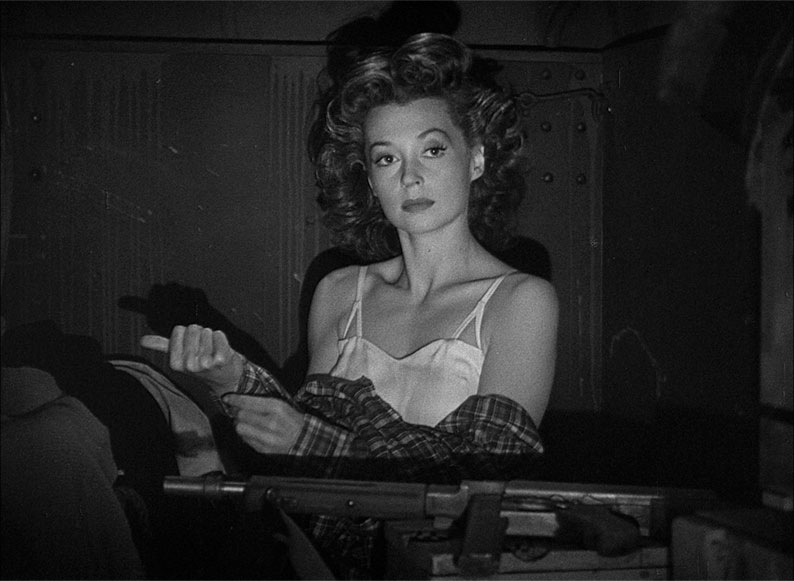
How this thread of the story plays out has a couple of impressively pull-no-punches surprises, so I'll leave it there, but Alvah is soon on his way to Italy where a plan has been hatched to allow him to make contact with Katerin's Italian colleague Giovanni Polda (Vladimir Sokoloff), who is working against his will in a country house under strict German guard. On his surreptitious black-of-night arrival in Italy, Alvah is met by a group of local resistance fighters, one of whom unexpectedly turns out to be an attractive young woman named Gina (Lily Palmer). Ah, there she is... The inevitability that a relationship that will likely develop between Alvah And Gina is signalled from the off by Alvah's "wow!" jaw-drop when Gina reveals her gender by stripping off wet clothing without a whisper of embarrassment, and by a couple of subsequent and slightly sleazy "hey, baby" grins that he insists on throwing her way a little later. Yet if convention requires them to eventually fall for each other, the road to that moment is not as straightforward as I was expecting, and there were a couple of times when I genuinely thought the film was going to break with tradition and prevent their professional relationship from developing into a personal one (which, frankly, would have been cooler). Gina is a resistance fighter first and clearly has no time for romantic tomfoolery, and even when the partisans deem it safer for Alvah to be secretly billeted with her, she's pragmatic about all aspects of the arrangement. Even when she is woken by an experience-triggered nightmare, Alvah offers comfort and reassurance and doesn't try to take advantage of this new chink in her emotional armour. There may be a whiff of Ninotchka about the gradual melting of Gina's tough girl persona, but the small snippets she drops about her life and her past make it easy to understand why she elects to hide behind it.
Although the evolution of Alvah and Gina's romance may seem to temporarily sidetrack the film, we're well past the halfway mark by the time it kicks off and a lot has happened in the busy build-up to it, much of which is impressively handled. The script, by Albert Maltz and Ring Lardner Jr., two members of the Hollywood Ten who were blacklisted shortly after the release of Cloak and Dagger (their work on the film was one of several scripts cited as ‘evidence' of their communist leanings), is smart and intermittently passionate in its politics and its humanism. An angry early speech delivered by Alvah to Walsh about how mankind could benefit from taking the money spent on building an atomic bomb and spending it on medical research instead clearly came from the heart, and I have to salute Cooper here, an arch-conservative in real life who delivers these lines with all the indignant anger of an ardent anti-war socialist. The script and direction also credit the audience with more smarts than many of the film's contemporaries. A prime example comes when Alvah first arrives at his hotel in Switzerland, where he's grilled at the bar on the current state of American industry by the ostensibly friendly and middle-aged Fritz (Ludwig Stössel), whom I immediately suspected was a Gestapo operative, something Alvah susses out every bit as speedily. When he escapes by making a b-line for glamorous American guest Ann Dawson (Marjorie Hoshelle), however, his attraction to her blinds him to the possibility that she might also be a Mata Hari-like spy. I quickly (and, as it turned out, wrongly) assumed that Alvah would be seduced by Ann's beauty and land himself in the soup as a result, yet just seconds after he sits down at her table he gets a phone call from his resistance contact Marsoli (Dan Seymour) informing him that Ann is one of the enemy's slickest operators. Yet instead of steering clear of her from then, Alvah turns the tables by romancing her (the progress of which is economically montaged) and then threatening to send damaging information on their relationship to her superiors in order to procure information Katerin's whereabouts. Cooper seems to really relish the scene when he reveals his true intentions to Anne, though takes a couple of seriously painful-looking slaps to his face for his trouble.
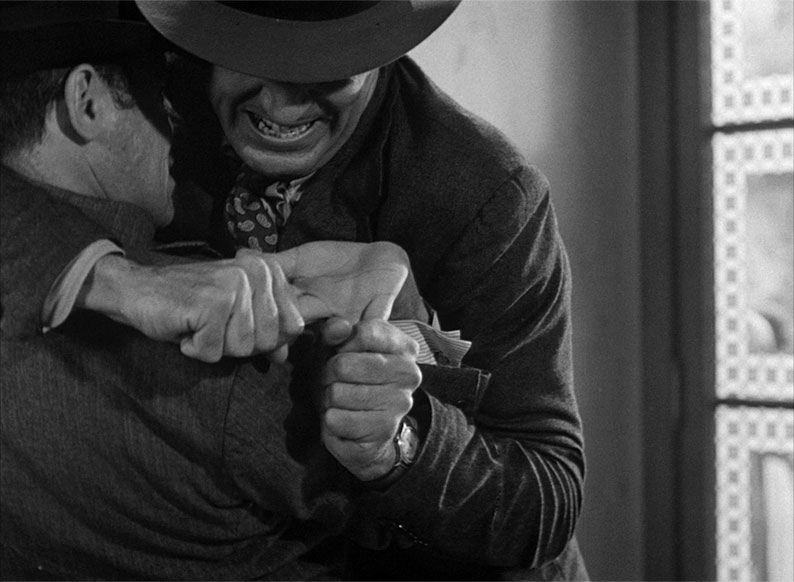
There's a tense sequence in which Alvah is being transported in the back of a goods van that breaks down at the most inopportune moment, a genuinely shocking moment when the partisans raid a house in the forest, and Alvah's meeting with Polda raises some interesting questions about loyalty to cause and county verses devotion to family. But the film's showpiece scene, which is all the more effective for occurring after we've spent what feels just a tad longer than necessary is on Gina and Alvah's romance, comes late in the film, when Alvah gets into a fight with an enemy agent in the foyer of an apartment block just a few feet away from a busy public thoroughfare. And it's an absolute belter, a brutal, wordless, fight-for-survival brawl in which a face is clawed until it bleeds, fingers are wrenched apart, a shin is scraped by a shoed foot, a chest is violently stamped on, and a throat is karate chopped. It's an extraordinary sequence, with the violence counterpointed by the romantic tune being played by a group of street musicians outside, and Gina going into autopilot mode and guarding the door rather than jumping headlong in; when she does briefly break off to lend a helping foot she is thrown to the floor, then instead of responding jumps rapidly up and returns to her post. It's not just the film's finest sequence but one that's up there with Lang's best (Lang himself was apparently proud of it), and directly prefigures a more famous scene in Hitchcock's 1966 Torn Curtain, which was designed specifically to demonstrate how difficult it would be for two ordinary people to kill a trained professional.
It builds to an ending that echoes the finale of a more widely seen wartime drama (in the spirit of avoiding spoilers, I'm not about to say which one), but this was not supposed to be the ending at all. The original finale, apparently shot by Lang at considerable expense, took the story to an altogether darker and more ominous conclusion and in the process firmly cemented the film's anti-nuclear message. This, however, did not sit well with producer Milton Sperling, who removed the entire final reel to give us the ending we have today, which effectively neuters the film's original political thrust (details of the content of this missing material are provided in the special features on this disc). Despite this, Cloak and Dagger is still a damned fine espionage thriller with a nicely woven narrative and strong performances across the board. But had it not been the subject of censorial meddling I have a feeling that it would later have become one of the most discussed films of its day.
No specifics of the transfer are provided in the booklet beyond the fact that it is framed in its original aspect ratio of 1.37:1. The film certainly appears to have undergone a degree of restoration, as evidenced in the stability of the image, the crispness of the detail, the fine film grain, and the pleasing tonal range and deep shadow area blacks of the contrast. The picture is also largely clean of damage but not completely so, with scratches, dust spots and other small examples of former wear and tear still visible in places. Intriguingly, there is a brief freeze-frame in which a collection of small scratches freeze along with the image – has this damage been on the negative since it was shot or was this freeze-frame recreated at the digital mastering stage? I suspect the latter. If you can ignore these small age-related defects, this is a fine transfer that at its best really shines – in the sequence in which Katerin tells Alvah about the Nazi threat to execute prisoners, you can clearly see that the emotional commitment of Helene Thimig's performance has prompted her eyes to tear up and her nose to run.
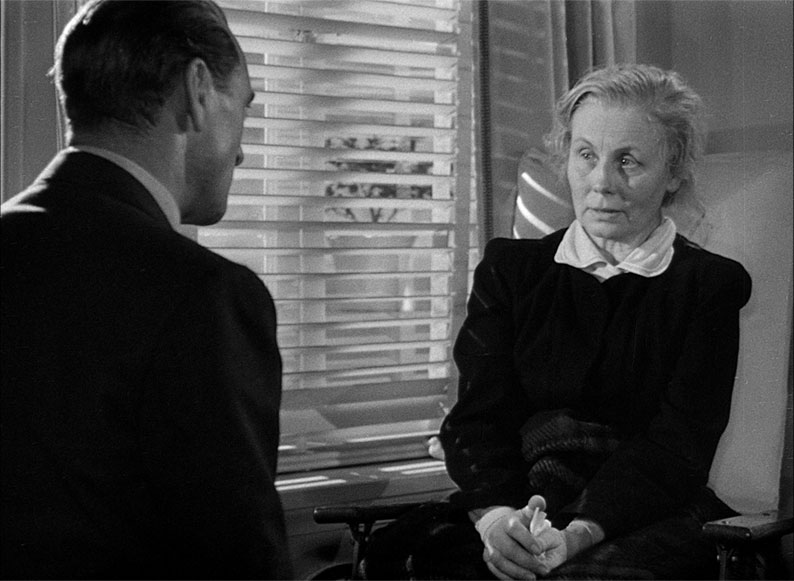
The Linear PCM 2.0 mono soundtrack also appears to have been restored, as while there are the expected restrictions in dynamic range, there is no distracting hiss or fluff in the background and no violent pops or other errant noises to contend with.
Optional English subtitles for the deaf and hearing impaired are available.
Commentary by Alexandra Heller-Nicholas
Melbourne-based film writer Alexandra Heller-Nicholas, who did such a great job on Eureka's dual format edition of Larry Peerce's The Incident (one of my favourite releases of last year) kicks off by acknowledging the worrying state of the current political landscape and emphatically reminding us, "the Nazis are the bad guys!" Despite a few dead spots, there is a lot of information provided on the film and those involved in its making, both in front of and behind the camera, as well as its politics and those of its soon-to-be-blacklisted screenwriters. She picks up on the film's more atypical elements, notes a moment where "Fritz Lang does Weekend at Bernie's," and goes into some detail about the excised final reel and how its absence impacts the film's intended anti-nuclear message. As someone who still gets amused by all the creative variants of the "one stick short of a bundle" idiom, I also smiled widely when she says of a simplistic comment made by Gary Cooper about communism, "Quotes like this might suggest that Cooper might not be colouring with a full box of crayons…"
Spycraft (19:15)
Another engaging video essay by writer, critic and filmmaker David Cairns, one that examines several aspects of the film including its style and its creators and cast, as well as providing information from the original script about that lost final reel. He remarks on the brilliance of the plotting and execution of the fight sequence (which took six days to shoot, we are informed), and acknowledges its similarity to the famed murder scene from the later Torn Curtain. And yes, as ever, I noted that down before I heard Cairns say it (it's frankly hard to miss).
Cloak and Dagger: Lux Radio Theater (57:58)
Camus and I have heard enough of these Lux Radio Theater productions now to have a good idea what to expect, which is a rapidly paced audio-only compression of the film's narrative, which is intermittently disrupted to fawn over the beautifying wonders of Lux soap. Here Lilli Palmer recreates her role from the film, but Gary Cooper has been replaced by...Ronald Reagan! Makes a kind of twisted sense I suppose, substituting one arch-conservative with another. Certainly the humanist and anti-nuclear elements of Maltz and Lardner's screenplay have been scrupulously excised here, though by this point both writers had been blacklisted and I've little doubt that this production went out of its way to distance itself from even the faintest whiff of controversy. The audio quality is inferior to that of other Lux Radio Theater adaptations that have made their way onto Blu-ray releases in the past couple of years, giving the show the air of an old gramophone recording being played back on one of those old wind-up players with a horn for a speaker. This is doubtless down to the condition of the source material, though it does make some of the dialogue difficult to hear clearly. The whole thing plays under a single image of the film's poster, which may present a possible screen burn risk for owners of plasma of OLED TVs.
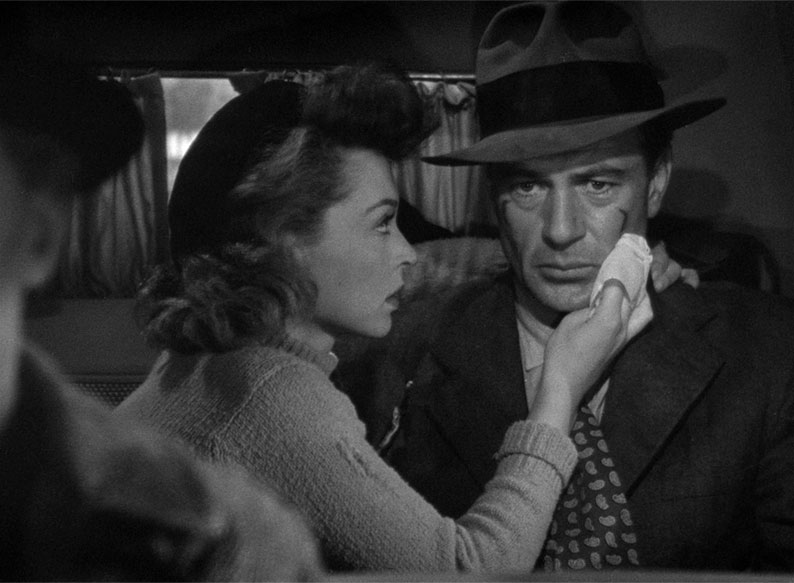
Cloak and Dagger: The Radio Series (approx. 660 mins)
In 1950, NBC commissioned a radio series based on the 1945 book Cloak and Dagger: The Secret Story of the O.S.S. by Office of Strategic Services veterans Corey Ford and Alastair MacBain, which was also the loose inspiration for Lang's film. Of the 26 episodes ordered only 22 were believed to have ever been broadcast, each running for approximately 29 minutes and starting with the soberly delivered quote at the top of this review. And all are included on this disc in their entirety. Yep, you read that right – check out the approximate total running time above. I'm going to come clean here and admit that I've not sat down and listened to them all as yet, though I have three excuses. Firstly, I'm in that rare position of being able to get a disc review out before the release date, and listening to this lot when I am able (I can only play Blu-ray discs at home at present and cannot lift the episodes off to listen to at work) would seriously delay the posting of this review. Secondly, each is visually accompanied by a single promotional image for the film, and as I have a TV that is a bit prone to burn-in, 29 minutes of the same unmoving image is a risk that I'm a bit reluctant to take. If I did, I'd probably end up listening to each episode in shifts for safety, which would hold up the completion of this review even further. I should note that this is not a complaint, as I fully accept that a moving image for each of the episodes would have been impossible without moving onto a second disc (it would need to be a video file rather than a static image), though option to switch that image off would have been nice. Thirdly – and this is very much a subjective call – I didn't find what I did listen to all that enthralling, and I did give about a third of the episodes a five or ten minute stab. Some are definitely more interesting than others, but the stories often plan in straightforward manner (except for the fine detail, the opening brief summary sometimes says it all), a couple of them feel padded out to fit the running time, and foreign characters tend to be played by American actors sporting a range of dodgy accents. I've no doubt that others will absolutely lap these up, and I'm frankly bowled over by the fact that I have been given the option to listen to them all (which, despite what I just said, I will do in time). A genuinely epic extra that for some will be reason enough to own this disc.
Booklet
First up, top marks to Jacob Milligan for his design work on a booklet whose Old Typewriter typeface and faded yellow pages nicely emulate the look of a wartime document (complete with a ‘confidential' stamp across many of the pages), an effect that only slips when the page colour switches to black and space requires the use of a narrow sans-serif font. As ever, the booklet opens with the main credits for the film, then devotes twelve pages (well, seven if you discount those given over to poster art, which is also of interest) to a typically excellent essay by Samm Deighan. This looks at the films made by Fritz Lang during WWII and makes a strong case for viewing Cloak and Dagger as a film that bridges the gap between the war movies of previous years and the Cold War thrillers that were soon to follow. Deighan also explores the film's anti-nuclear message, the blacklisting of its screenwriters, and the excising of Lang's original ending. This is followed by an episode guide for Cloak and Dagger: The Radio Series, which includes brief plot summaries, writer credits and original transmission dates.
A solid and intermittently exceptional WWII espionage thriller that, while perhaps not one of Fritz Lang's very best, contains sequences that remind you that you are in the hands of a genuine master of cinema. It's a damned shame that Lang's original finale has been lost, but this is still a strong film and I'm genuinely gobsmacked by the notion of a single Blu-ray (and, I presume given that this is a dual format release, DVD) disc that contains a remastered transfer of the film and over 17 hours of special features. Sure, most of them are audio only, but in terms of value, this disc just cannot be faulted. Warmly recommended.
|